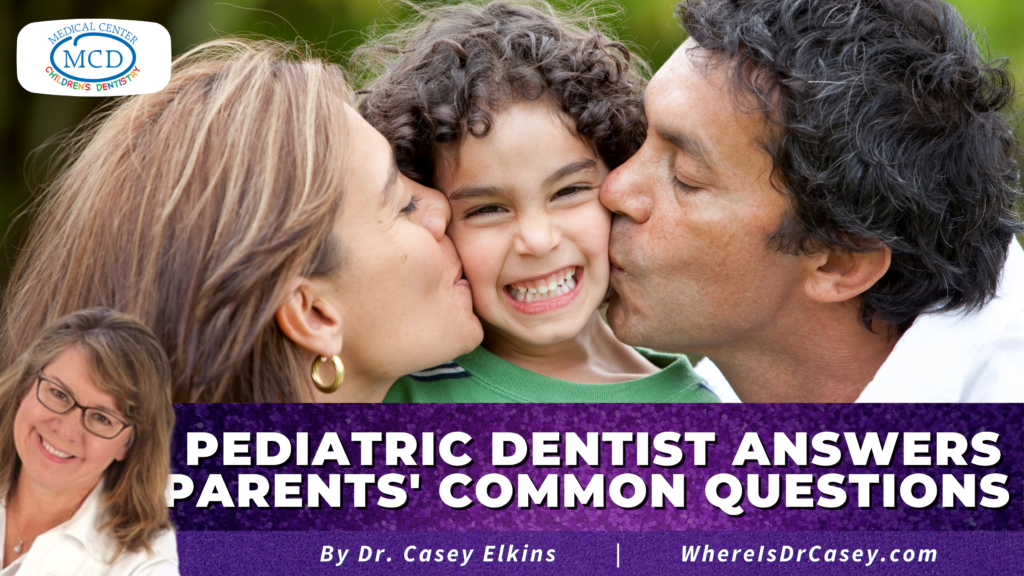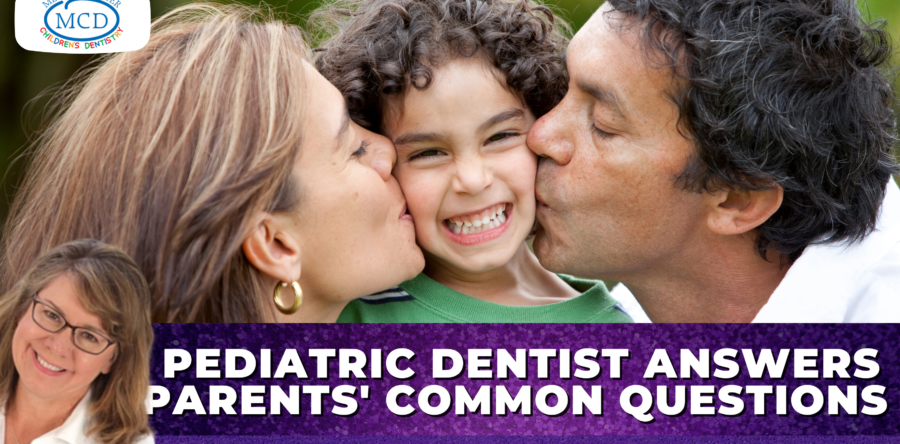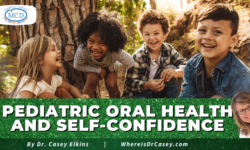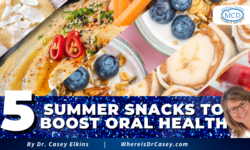
As a pediatric dental staff, we hear a lot of questions from both patients and their parents! While sometimes kids are concerned about what instruments do or what "tooth germs" look like... parents often have some pretty important questions to ask. Sometimes, those questions even pop in mind when you aren't at your pediatric dentist's office. (How inconvenient!) This is why Dr. Casey aims to arm parents with the knowledge they need to tackle any dental challenge that may come their family's way. Since dental topics can be overwhelming, we chose to start with simply answering some of the most common questions we get from parents.
How Do I Clean My Child's Teeth?
Every baby needs oral care too! Don't worry, it starts very simple by monitoring what your baby consumes before bed. Babies are actually prone to cavities as well. It is known as "Baby Bottle Tooth Decay" and presents as a pattern of rapid decay often associated with prolonged nursing. It is most common among children that go to sleep while breastfeeding or bottle-feeding. For this reason, we recommend that mothers avoid nursing children to sleep and only place water in their bedtime bottles. Once they begin to eat food, that is when kids need more hands-on oral care.
Usually, we recommend mothers wipe a baby's gums, especially as they start teething. Once their first tooth has erupted, you can use a baby toothbrush and a tiny dot (smaller than a pea) to start lightly brushing their teeth. We only recommend using a toothbrush designed with soft bristles and a small head that is specific for use on infants. Most children's toothbrushes have an age recommendation listed on the packaging. We recommend brushing children's teeth twice per day to prevent cavities and develop lifelong, healthy habits.
What Age Should My Child Have Their First Dental Visit?
This is a question we are asked by almost all of our patient's parents (at least with their first child). "When do we take our kids to the dentist?" Dr. Casey recommends either right after their first birthday or after their first tooth comes in, whichever is first. This is the same that the American Dental Association (ADA) recommends as well. Some parents stress about whether or not their child is reaching developmental milestones "on time." We encourage parents not to worry about which comes first. We believe that each child's development is a bit different, there is no "exact time" for a child's first tooth to appear.
Most children's teeth begin appearing between 6 and 12 months, however, this is not the case for every child. We encourage any parent who would like to schedule their child's first visit early to do so, that way they feel prepared and informed. We believe knowledge is power and we would love to make time to answer any questions you may have. Some parents will bring their children in as they begin teething for one-on-one information on the best methods to keeping their teeth clean.
Should My Child See A Pediatric Dentist or A Family Dentist?
A lot of parents are left wondering what the difference is between a pediatric dentist and a family dentist. A pediatric dentist has specialized in the treatment regarding the oral health of young people. In fact, they do an additional two years of training after dental school in the unique needs of infants, children, and adolescents, including those with special health needs. A family dentist is a general dentist that is willing to see patients of all ages, including children. While there are many good, qualified family dentists that work well with children, pediatric dentists work almost exclusively with adolescent and differently-abled patients.
The reason that Pediatric Dentists go through two extra years of specialized training is due to the fact that children have different dental issues than grown adults. Pediatric Dentists, much like Pediatricians, are knowledgeable in treating needs specific to children. Some parents may wonder how much of a difference a child's dental needs might be compared to those of their own. Honestly, they may be surprised to learn just how different they actually can be.
Is Thumbsucking Harmful For My Child's Oral Health?
The simple answer is "yes." While thumbsucking and pacifiers can be soothing to children, there comes a point where the habit does need to stop before starts to cause oral health issues. If a child continues a thumb and pacifier sucking habit for too long a period of time it can create crowded, crooked teeth or even bite problems. Most children do outgrow these habits on their own nature or with little help from parents.
Generally, these soothing habits are not an issue unless they are still commonly practiced as new teeth are coming in. For parents looking to find natural, healthy approaches to getting their children to stop sucking their thumb, we recommend...
- Sticker Charts to reward the days they have gone without sucking their thumb or pacifier
- "Painting" nails with tastes they may dislike such as lemon or lime juice
- Find ways to distract them from the action when you catch them
While we love encouraging parents to help their children along, we are also aware that children develop differently, and sometimes habits, such as "thumb-sucking" may be signs of other potential health risks. If you are concerned about your child's oral health habits, we are always here to support you through it with knowledge, tools, and advice.
What Are Dental Sealants?
Dental sealants are clear or shaded plastic that dentists apply to patients' teeth to keep them cavity-free. These sealants fill in the grooved and pitted surfaces of the teeth that are known to be the hardest to clean. This creates a barrier that shuts out food particles so that they do not get caught and ultimately cause cavities. As most parents know, tooth decay is the number one most common childhood disease. Dental sealants are one of the best ways to be proactive about your child's oral health, especially if they run the risk of cavities now or in the future.
Some parents are concerned about the safety of dental sealants and Dr. Casey is here to ensure them that there really isn't a cavity preventing option that is as effective and safe as this one is. There are no negative health side effects and the process of applying the sealants (by a dental professional) is both fast and comfortable. In addition, sealants are known to effectively protect teeth for many years. This makes them the perfect solution for families that are health conscious and always busy on the move!
How Safe Are Dental X-Rays?
Many parents are concerned with their children's safety on every front. Trust us, we understand as most of our staff are parents themselves. We know that safety is one of the most important factors that parents take into consideration, it is one of ours too! We aim to provide the best dental care that we can for our patients and their families, including state-of-the-art dental equipment designed to make each visit quick, safe, and easy for us all. This includes our in-house X-ray technology.
At Medical Center Children's Dentistry, we believe in offering cutting-edge, effective care for our young patients. We utilize child-friendly dental procedures and keep safety at the forefront of our practice at all times. We abide by contemporary safeguards, such as the use of lead aprons and high-speed film which minimize the amount of radiation. While the received radiation received during a routine set of X-rays at a dental examination is extremely small and there is very little risk, we are still particularly mindful of minimizing the exposure of our pediatric patients to any forms of radiation.
When Do Kids Lose Baby Teeth?
Many parents wonder, "when will my child lose their baby teeth?" Honestly, there is no exact moment set in stone! It is natural for children to lose various teeth at different ages as they grow and their adult teeth begin to form beneath. Trust us, we know from experience that no two children will lose their teeth at the same exact ages! They often times won't even lose them in the same order. It all comes down to what is going on beneath their gums.
As a child's incoming adult tooth beings to erupt, it will naturally cause the roots of their baby teeth to be reabsorbed into the gums. With less stability, their teeth will become looser over time, until there is only a small amount of tissue still holding them still in place. This process typically goes unnoticed by the child until the tooth is finally loose enough to wiggle around. Surprisingly, kids usually don't mind once they learn the benefits of a friend like the Toothfairy!
What Do I Do If My Child Knocks Out A Permanent Tooth?
Dental emergencies are never planned and usually not expected. The most important thing for everyone to do is to remain calm. Try to locate the tooth, but hold it only by the crown, not by the root. If possible, replace the tooth in the socket and hold it there with clean gauze or a washcloth. If you cannot place the tooth back in the socket, immediately get the tooth into a clean container of dairy-based milk. Take your child and the tooth (still in socket or milk) immediately to their pediatric dentist. The faster you and your family act, the higher the chances are of saving your child's tooth.
While some teeth get knocked out by accident, most happen during participation in sports. For this reason, we recommend that a mouth-guard is part of your child's consistent sports equipment. This unique sports gear is made of soft plastic and is designed to fit comfortably to the shape of an athlete's teeth. They are efficient at protecting a child's teeth, lips, cheeks, and gums from sports-related injuries. We are always willing to help parents with custom-fit mouth guards for their children or recommendations for ones available for purchase locally over the counter.
At Medical Center Children's Dentistry, we believe that informed parents make the most informed decisions for their children's health. This is why we believe in taking the time to ensure our patient's parents feel competent and confident every step of the way. Our patient's parents are always, always, always welcome to reach out to our office with any questions or concerns that they may have. We strive to keep our parents and patients as informed as we can through our Instagram and Facebook content, as well educational articles.







2 Responses